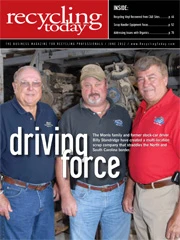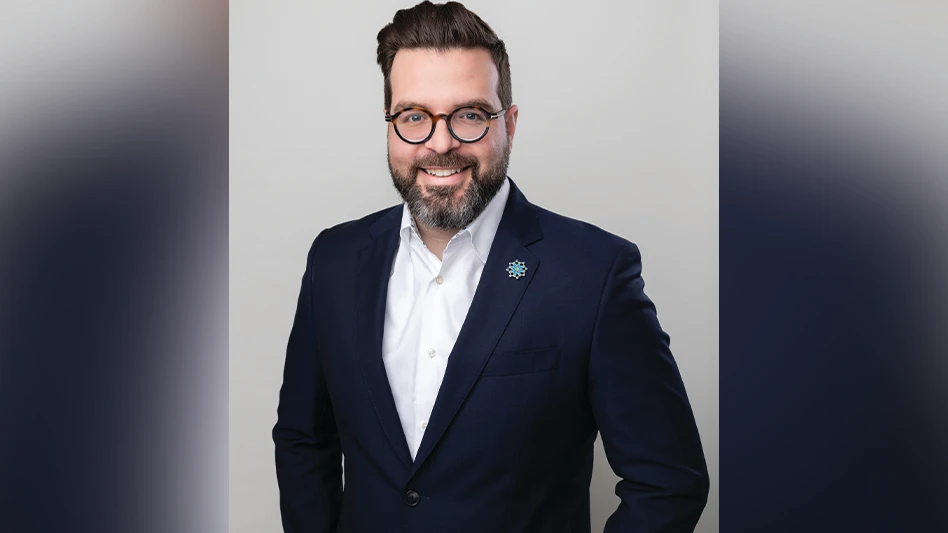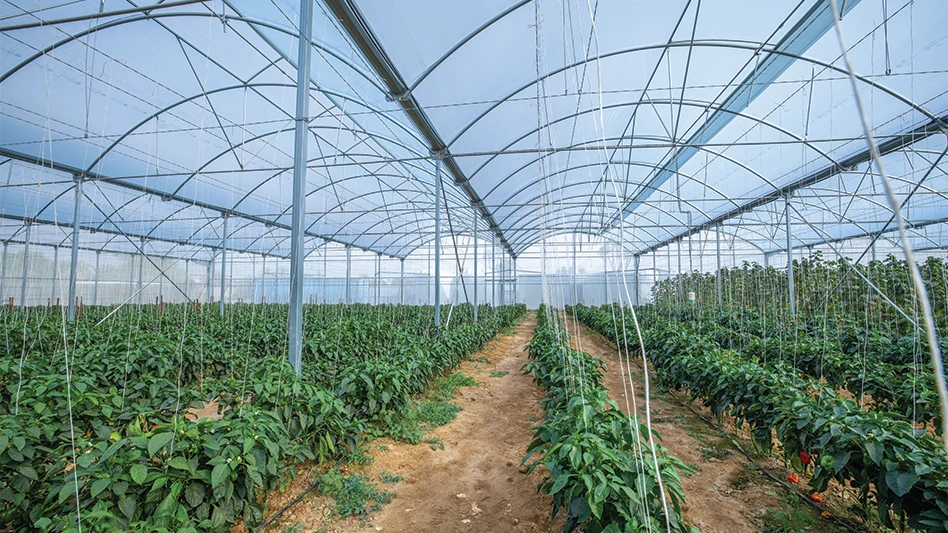 ReCommunity, Charlotte, N.C., was formed when the venture capital firm Intersection Partners and a group of investors acquired some of the recycling assets of FCR Inc., a subsidiary of Casella Waste Systems Inc.
ReCommunity, Charlotte, N.C., was formed when the venture capital firm Intersection Partners and a group of investors acquired some of the recycling assets of FCR Inc., a subsidiary of Casella Waste Systems Inc.
Intersection renamed the company ReCommunity to highlight its mission of leading what it called the “Recovery Revolution.” According to the company, its approach would enable community partners to generate additional revenue, recover community-owned resources, create new jobs, fund budget shortfalls and reduce their carbon footprints.
With its recent acquisition of Hudson Baylor in early 2012, ReCommunity says it has become the largest “pure play” recycling company in the United States. The company operates 36 facilities in 13 states, including 30 material recovery facilities (MRFs), five transfer stations and one glass processing operation.
Jeffrey Fielkow, ReCommunity executive vice president of revenue and growth, joined the company in November 2011. However, he is no neophyte when it comes to the recycling industry. Fielkow’s career in the industry began in 2000 when he joined The Peltz Group, a Milwaukee-based paper recycling company that was eventually acquired by Waste Management Inc. (WMI).
Since then, Fielkow has been a WMI Midwest market area vice president, a minority owner and chief operating officer of the Container Recycling Alliance LLC and a vice president of sustainability for TetraPak, through which he played a key role in the Carton Council.
As an executive with ReCommunity, he is bullish about the company’s opportunities. “As a pure play recycling company, I believe that being truly conflict-free is also essential to making positive change,” Fielkow says.

Recycling Today Senior Editor Dan Sandoval had the opportunity to ask Fielkow several questions.
Recycling Today (RT): Since its founding slightly more than one year ago, your company has grown quite significantly. What is ReCommunity’s strategy going forward, and does it involve growing through acquisition and organically?
Jeffrey Fielkow (JF): We are growing organically in significant ways. It was important to grow through acquisition to create a platform from which to scale. We moved our material processing from zero to 1.8 million tons in just 12 months.
With our strong platform company, we can now grow organically, which was our original plan. That growth will come both horizontally, as we look for green field projects and expand service offerings in our existing facilities, along with vertical growth where we identify and see opportunities to create meaningful value with the commodities we recover.
Our acquisitions allow us to round out our reach and enter new markets. Moving forward, we will tuck in acquisitions where there is strategic value. We have built a platform to grow our company and will use organic growth and strategic acquisitions to grow both horizontally and vertically. Broadly speaking, this is how we plan to attack our opportunity.
RT: Your company has a large presence throughout the Eastern half of the country. Where are you positioned in the Southwest and West Coast?
JF: Our presence east of the Mississippi is largely due to the former FCR operations, which were entirely east of the Mississippi River. The Hudson Baylor acquisition in January (2012) gave us our first presence in the West with several operations in Arizona. This gives us a base from which to increase our footprint in the Western United States.
RT: What technological changes in regard to single-stream and municipal recycling you seen?
JF: Based on data and the results we’ve seen, single-stream increases participation and the volume of recyclables from residents and businesses. Single-stream just makes recycling easy for customers, so they recycle more.
Just like all types of technology, the evolution of single-stream technology has evolved exponentially. Moore’s Law predicted a rapid doubling of technological advances in the computer industry. Single-stream is Moore’s Law for the recycling industry. The technology keeps getting better, which allows us to process more material.
Not only is our throughput faster, we’re also able to increase the types of recyclables, and we’re getting a higher quality end products. We see single-stream as a true win, win, win. Through advancing technology we improve our quality and provide better service to our municipal customers. Everyone wins.
At ReCommunity, we’re equipment and vendor agnostic. We look at all types of equipment from all types of vendors, which allows us the flexibility to embrace new technology quickly. More importantly, it allows us to use the best system for each specific application, which is not necessarily the cheapest equipment. Through this approach, we’ve seen better separation through improving disk technology and air flow; we’re seeing better use and recovery with optical scanners.
RT: Quality is becoming a greater issue for the recycling industry. What steps can/should ReCommunity take to boost the quality of its material?
JF: We take a multi-pronged approach when it comes to quality. First is education. That is, educating residents and businesses so the right material goes into the bin in the first place. I cannot underscore enough the importance of being a public advocate. There is no doubt that education improves the quality of materials going into the stream.
Second, operating and investing in advanced technology to make sure our equipment is designed to produce high-quality end products for the market.
Third comes making sure quality is in the DNA of the operation’s lifeblood.
At ReCommunity, our operations are founded on three principals: safety, quality, productivity, and in that order. First, we want to keep our people safe. Period. Second, the global manufacturers who rely on us need quality products so they in turn can produce quality products from their facilities. You have to believe in quality.
We enjoy a stellar reputation in the industry for producing the best materials. It’s because quality matters to us.
RT: What are the biggest challenges in the recycling industry?
JF: I’d say there are four big challenges: right-sizing the residential recycling bin, away-from-home recycling, changing stream composition and the general volatility [of commodity prices].
 We need to right-size residential bins and collection to make sure all recyclables are recovered at the home. Too many times I’ve seen residents fill up the recycling bin before they’re picked up because the bins are too small or are not picked up enough. When that happens, residents tend to send the recyclables that won’t fit in the bin to the landfill.
We need to right-size residential bins and collection to make sure all recyclables are recovered at the home. Too many times I’ve seen residents fill up the recycling bin before they’re picked up because the bins are too small or are not picked up enough. When that happens, residents tend to send the recyclables that won’t fit in the bin to the landfill.
Away-from-home recycling in commercial and institutional settings is anemic. We just don’t have the right processes or uniform structure in place.
The changing stream composition means we have to stay alert to what recyclables people are putting in the stream and when they change. We’ve seen such a shift with the decline in newspaper readership. We have to be attuned to changing lifestyles and how those changes in society change the composition of what’s coming into the MRFs. We then need to make sure we have the technology to handle new materials.
As I said earlier, general volatility is part of doing business in this industry. That volatility can force short-term decisions that affect long term planning.
RT: Your company is owned by a private equity firm. How does this make ReCommunity different from companies that grew out of the solid waste business? What are some of the advantages to having the support of a private equity firm such as Intersection Partners?
JF: Intersection Partners are great owners for ReCommunity. Not only do they have access to private equity and a strong balance sheet, but they are also a conflict-free company for us. They don’t bring any subsidiaries that would compete with or restrict ReCommunity. The principals are actively involved with ReCommunity, lending their business savvy and expertise to help define our company and redefine our industry.
Intersection Partners approaches their investments as principals in the businesses in which they invest. They are great partners who work with management teams to grow next generation businesses. They are not passive investors.
Intersection Partners invest in transformational businesses that can transform communities and redefine businesses. Their passion is in creating and growing meaningful enterprises that advance the social and environmental mission of health care services and renewable resources in communities. ReCommunity is in their sweet spot.
RT: What are some of the big upsides to the recycling industry?
JF: We’ve always viewed this as a “recovery revolution” play that truly builds a business on resources recovered from the waste stream. That is the upside of this industry: building a global economy that uses recovered resources to make goods rather than using natural resources.
As more and more people, especially those who run cities and counties, realize the vast potential value of their waste streams, we’re getting more and more public partners coming to us to form partnerships. Simply put, through the help of ReCommunity, we are entering the recovery revolution. The level of awareness inside the United States that municipalities can come into control of their resources is growing rapidly. Municipalities are striving for zero waste and that is good for the recovery revolution. The biggest upside is we are truly embracing and entering the recovery revolution.
We’re also seeing that this industry can go through really hard economic storms, like we saw in 2007 and 2008. During that time, we saw that people’s will to recycle in a downturn does not diminish. Most recycling programs were kept intact during the downturn, which gives us solid reason to believe that society is looking at the recovery revolution with the right lens.
RT: Markets are quite volatile for many recyclables. What steps can ReCommunity take in an effort to smooth out this volatility?
JF: Volatility has always existed in this business. Volatility is a cost of doing business in this industry and, to be successful in this business, it’s important to understand the cyclical nature of commodities.
At a macroeconomic level, if we look long term, we will be a resource-constraint population as the population increases, urbanization continues to grow and the middle class continues to rise. All three are the triple intersection that will create resource scarcity around the world. Because of these dynamics, long-term volatility may lessen over time, as the population will need more and more goods produced.
In the meantime, we have a sophisticated system at ReCommunity to smooth out that volatility. We offer our customers ways to hedge material where we can provide fixed financial prices for commodities. It is a shared risk between our municipal customers and us.
RT: A number of companies are embracing greater environmental sustainability, whether through converting some hard-to-recycle items into energy, or adding other recyclables to the stream. Can you tell me what ReCommunity’s outlook on some of these strategies is? What steps is your company taking in this regard?
JF: Our outlook is that the entire recycling market is moving forward. We are looking at all opportunities as ways to grow our business and meet our mission of diverting as much as we can out of landfills and into the recycling stream.
The DNA of our company is to be right in the middle of the recycling supply chain. That approach puts us in the best position to tie all parties together, from the municipality to the end user. Our model shows that by pulling everyone together, we can add formerly unrecyclable products to the recycle stream.
Many industries are being forced to consider extended producer responsibility, which may require legislating solutions around their products. In other words, if you can’t figure out what should be done, then you will be told what to do. We embrace another approach—to support and work with producers who act responsibility and who want to act responsibly. We know we can make change happen without legislation.
One great example comes from the Carton Council, where we learned we have to be constantly attuned to changes in consumer packaging and consumer lifestyle.
The recycling stream constantly evolves. That is not new. It has been happening for years. Not long ago plastic bottles were not accepted in the stream, but new technology provided a way to allow us to accept them. At ReCommunity, we prepare for an ever-changing recycling stream. We are always looking for products that are outside the bin that can be put inside the bin.
Just as we did with milk and juice cartons, we look to help other industries that have similar problems that we know we can solve by working together on solutions. Finding ways to recycle the hard to recycle; we’ve done it before and we can do it again. That is ReCommunity.
Jeff Fielkow is executive vice president of revenue and growth for ReCommunity, headquartered in Charlotte, N.C. He joined ReCommunity in November of 2011 and is responsible for designing and executing the company’s sales strategy. Fielkow can be contacted at jeff.fielkow@recommunity.com.

Explore the June 2012 Issue
Check out more from this issue and find your next story to read.
Latest from Recycling Today
- APR announces Recycling Leadership Award winners
- Glass Half Full opens glass recycling facility in Louisiana
- AmpUp partners with Roundtrip EV
- Global Recycling Day event supports Pittsburgh school's recycling efforts
- President signs executive order on critical minerals
- Registration opens for Scrap Expo 2025
- Toyota opens ‘circular factory’ in UK
- Agilyx works with former Plastic Energy CEO on sourcing venture





